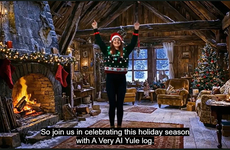
MIT Uses AI to Superimpose Trump's Face on Frankenstein
Kalin Ned — January 29, 2019 — Pop Culture
Late last year researchers and students from the Massachusetts Institute of Technology (MIT) released political Halloween-themed videos that saw Donald Trump in the role of 'Young Frankenstein' from the 1974 film directed by Mel Brooks and as Bette Midler in the 1993 'Hocus Pocus' by Kenny Ortega. Wildly entertaining, somewhat disturbing and also quite funny, the project is a true testimony to how far AI technology has gone in such a short time span.
The creators used machine learning and AI "to generate new images by looking at thousands of existing pictures." In collaboration with deepfake video expert DeepHomage, the MIT group was able to collect data from 3,000 photos of Donald Trump and successfully insert the president in the classic Halloween-themed videos.
The results are deemed to be "suitably ghoulish" and "realistic-looking."
The creators used machine learning and AI "to generate new images by looking at thousands of existing pictures." In collaboration with deepfake video expert DeepHomage, the MIT group was able to collect data from 3,000 photos of Donald Trump and successfully insert the president in the classic Halloween-themed videos.
The results are deemed to be "suitably ghoulish" and "realistic-looking."
Trend Themes
1. Political Deepfake Videos - The rise of AI-generated political deepfake videos poses security, legal and ethical challenges, but also creates opportunities for new businesses or startups to develop robust solutions to detect and prevent their harmful effects.
2. AI-enhanced Video Editing - AI-powered video editing tools show potential for disrupting the entertainment and advertising industries, as well as creating new multimedia forms that blur the boundaries between fiction and reality.
3. Crossover Pop Culture - The convergence of modern political events and classic pop culture trends presents a creative opportunity for marketers and content creators to leverage such viral moments and generate fresh, engaging content for their audiences.
Industry Implications
1. Media & Entertainment - As the entertainment industry transitions to digital platforms, there is a growing need for more advanced video editing and production tools that leverage AI and machine learning capabilities.
2. Cybersecurity & Surveillance - The misuse of deepfake technology for propaganda, manipulation or impersonation purposes raises concerns about privacy and security. This creates a market for cybersecurity and surveillance companies to develop stronger detection and prevention measures for political deepfake videos.
3. Marketing & Advertising - The popularity of viral political videos and memes opens up new marketing opportunities for brands to connect with audiences through pop culture references and social media engagement.
0.5
Score
Popularity
Activity
Freshness















